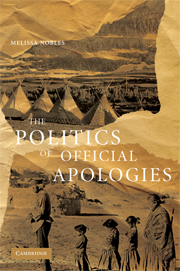Book contents
- Frontmatter
- Contents
- Preface and Acknowledgments
- 1 Toward a Membership Theory of Apologies
- 2 History of National Memberships in Australia, Canada, New Zealand, and the United States
- 3 To Apologize or Not to Apologize: National Histories and Official Apologies
- 4 Beyond Sentiment? Apologies and Their Effects
- 5 The Weight of History and the Value of Apologies
- Appendix: Twentieth- and Twenty-First-Century Public Apologies
- Bibliography
- Index
2 - History of National Memberships in Australia, Canada, New Zealand, and the United States
Published online by Cambridge University Press: 24 May 2010
- Frontmatter
- Contents
- Preface and Acknowledgments
- 1 Toward a Membership Theory of Apologies
- 2 History of National Memberships in Australia, Canada, New Zealand, and the United States
- 3 To Apologize or Not to Apologize: National Histories and Official Apologies
- 4 Beyond Sentiment? Apologies and Their Effects
- 5 The Weight of History and the Value of Apologies
- Appendix: Twentieth- and Twenty-First-Century Public Apologies
- Bibliography
- Index
Summary
This chapter analyzes the national histories of Australia, Canada, New Zealand, and the United States in light of their policies affecting the national membership of indigenous peoples. Although national histories are sometimes vigorously disputed, as we shall see, there is ample agreement about the thrust of government policies affecting indigenous peoples and the motivations and ideas that supported those policies. These histories are essential to my argument in two ways. First, governments have apologized for (or have been asked to apologize for) specific acts and for the larger policies of which these acts were a part. Second, the past terms of national membership have, to a great degree, shaped both the ways in which indigenous groups have mobilized and the claims they have made. The discussion that follows is organized according to the three dimensions of national membership – legal, political, and affective – and analyzes the actions of state actors who have and continue to decide, although not without resistance from or sometime in consultation with indigenous peoples, the extent and meaning of indigenous membership. Apologies politics should be understood as part of this ongoing dynamic of negotiation, where state officials and indigenous groups have each sought to structure and restructure the terms of membership, usually in diametrically opposed ways. State officials built nation-states, at the expense of substantial indigenous political, economic, and social autonomy. Indigenous peoples, in turn, have fought to preserve and regain some measure of autonomy to shape their collective futures.
- Type
- Chapter
- Information
- The Politics of Official Apologies , pp. 42 - 70Publisher: Cambridge University PressPrint publication year: 2008

